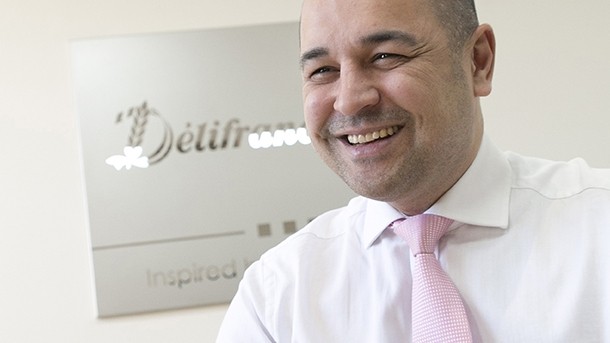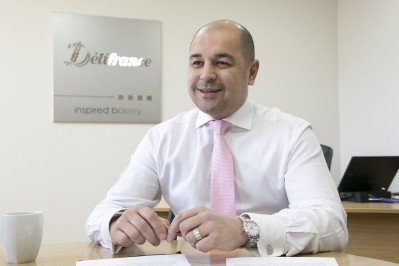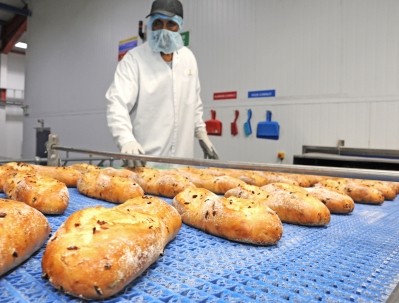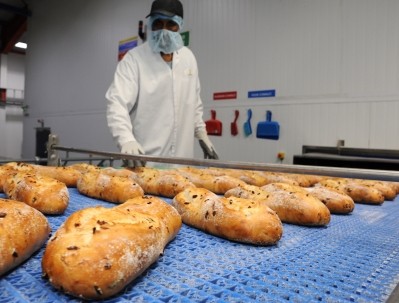Me and my factory
Délifrance UK in focus: meet the operations manager at Southall

I have been the operations manager at the Délifrance UK (Southall) site for four years. Initially, I was in charge of production and logistics, but during my time here I have taken on the additional responsibilities of health and safety, quality control and new product development (NPD). In fact, the only departments I don't look after are sales and finance!
When I first trained in engineering, I never thought there would be so much potential for a career in that field within the food industry.
I entered the bakery sector in 2000, when I joined Kate’s Cakes. On top of engineering, I was handed responsibility for logistics, which was an important step in my development. The company grew considerably during my time there, and in 2007 it was bought by CSM.
The new owner was looking for someone who knew the business and product range well, and when I jokingly said that sounded like me, they offered me a role in sales. There can't be many who have moved from engineering, to logistics, on to sales, but I took on the challenge.
By 2009, however, I realised that sales wasn't really me my heart was in operations. So, after short-term contracts at a couple of small bakeries, I was introduced to Délifrance UK md Ian Dobbie, and the rest is history.
Over the past four years, this job has changed from a 'doing' role to a strategic role, focusing on continuous improvement and development of both the team and site.
Central to my job has been to deliver Renaissance the investment project undertaken by NutriXo, Délifrance's French owner, to develop the bread line with modern equipment.
£30M investment (RETURN TO TOP)
A significant part of the company’s £30M investment into the site, which was bought from Premier Foods in 2009, has gone into Renaissance. It includes a new stone-baked bread line, an innovation lab and a 500-pallet dry goods warehouse. The stone baked bread oven is made from Italian Serpentino stone, which gives a better heat transfer than traditional stone, giving the bread a rustic crust and an open texture.
The line also has automatic scarification through the use of robotic arms, the latest dough lamination technology, and new weight regulation and control systems.
Rustic bread is a key growth area for us. Going back 20 years or so, all that was available in shops was sliced bread, crusty rolls and baguettes. But more recently, consumer awareness around bread has grown considerably. They are looking for more authenticity and variety, and we can deliver that with the Renaissance line.
So, our rustic breads are authentically French, if you like. And even though we’ve invested in automation, we still follow artisan methods.
But it's not all just about making bread either. We've spent a lot of money on the foundations of the business, including upgrading the refrigeration plant and the water treatment plant. Sustainability is a big focus for us our new oil-fired oven, for instance, uses a lot less energy than a conventional oven.
As part of our continuous improvement programme, we have also moved toward lean manufacturing. We operate 24/7 on a rotating shift pattern, and lean manufacturing has allowed us to be a little more effective in our practices and improve the flow of the workplace, right down to things like general paperwork and assisting staff on the factory floor.
We’re not experts in this field yet, but we’re developing as we go. Staff are beginning to get a grasp of what lean manufacturing means. Initially, most thought it's another job or project to take on, but it's more of a cultural thing.
Just recently, we've progressed our focus down to the factory floor, and have really tried to assist the guys there to take more of a ‘bottom-up’ approach to problem-solving.
There are people on the shop-floor who are seeing everyday problems that they aren’t able to tackle, so it's enabling them to raise and deal with those issues and concerns directly. And if they are able to, it raises their motivation and enthusiasm. But if they can't, there's a clear route for it to be escalated to someone more senior.
Strategic role (RETURN TO TOP)
While my role is now more strategic, it can be easy to get drawn into the day-to-day operation of the business, which can throttle your team.
There were times early on in my career when I was given a lot of autonomy, and I think it allowed me to develop more quickly. So, my job is to influence staff, but also to learn from their ideas and make them flourish.
One new idea is to have a matrix board on the factory floor, which serves as a visual performance indicator that staff can use to track workflow and identify any potential bottlenecks. It won't be used by management, but it influences factory floor staff to drive themselves, which in turn brings benefits to the business.
Training is important to me as well. As a former apprentice myself, I'm aware of the lack of engineering apprenticeships industry-wide. That's certainly something I would like to address in the near future.
Staff development (RETURN TO TOP)
We're also focused on developing the people within the business. That includes leadership and management training for the shift managers as well as in-house classes for our dough-makers.
We offer some staff the IPQ (Industry Proficiency Qualification), and we've just employed someone from the National Bakery School to join the NPD department.
For me, NPD is the lifeblood of any business. And it’s not just about developing products, it's about challenging your processes, and being able to deliver that effectively and consistently. I think that's why NPD ended up on my lap.
As a company, we need to keep in front of the market, and we’ve always got to be pushing the boundaries to deliver something new.
Southall is a strategically important site for the Délifrance group, and it’s one that will continue to be invested in. Payback on Renaissance is currently in-line with expectations, and the stone-baked line is running to its planned capacity.
My challenge now is to work out how we are going to further develop the site, based on customer and consumer needs. But that I love, because it gives you the energy to move forward, and to really influence change.
-----
Factory facts (RETURN TO TOP)
LOCATION: Great Western Industrial park, Southall, Greater London. UB2 4SB
SIZE: 6,790m2 (bakery), 9,000m2 (cold store). 11,000 pallet storage capacity
TURNOVER: £150M (2015, UK business)
MAIN PRODUCTS: Rustic Breads and French Classic Breads. Stone baked line includes: rolls (white, sesame seed topped, malted wheat topped, poppy seed topped), ciabatta, Parisien, baguette, half-baguette.
CUSTOMERS: Retailers, wholesalers and foodservice.
-----
Personal
NAME: Frank Bird
AGE: 43
DOMESTICS: Married, with three boys.
OUTSIDE WORK: I’m a keen photographer. I'm also a volunteer coach for my son’s under-eight football team, which is great fun.
GREATEST ACHIEVEMENTS: The development of the Southall team, and the delivery of the Renaissance line. I'm very proud of both, and of my colleagues involved.
ADVICE TO YOUNGER SELF: Pursue what you believe in, but make sure you involve others who share your vision. Support them, and invest your time in their development.
Online Insight: Frank Bird (RETURN TO TOP)
Fancy a tour around the Délifrance (Southall) site, and the new stone-baked rustic bread line? Visit our exclusive online gallery.
















